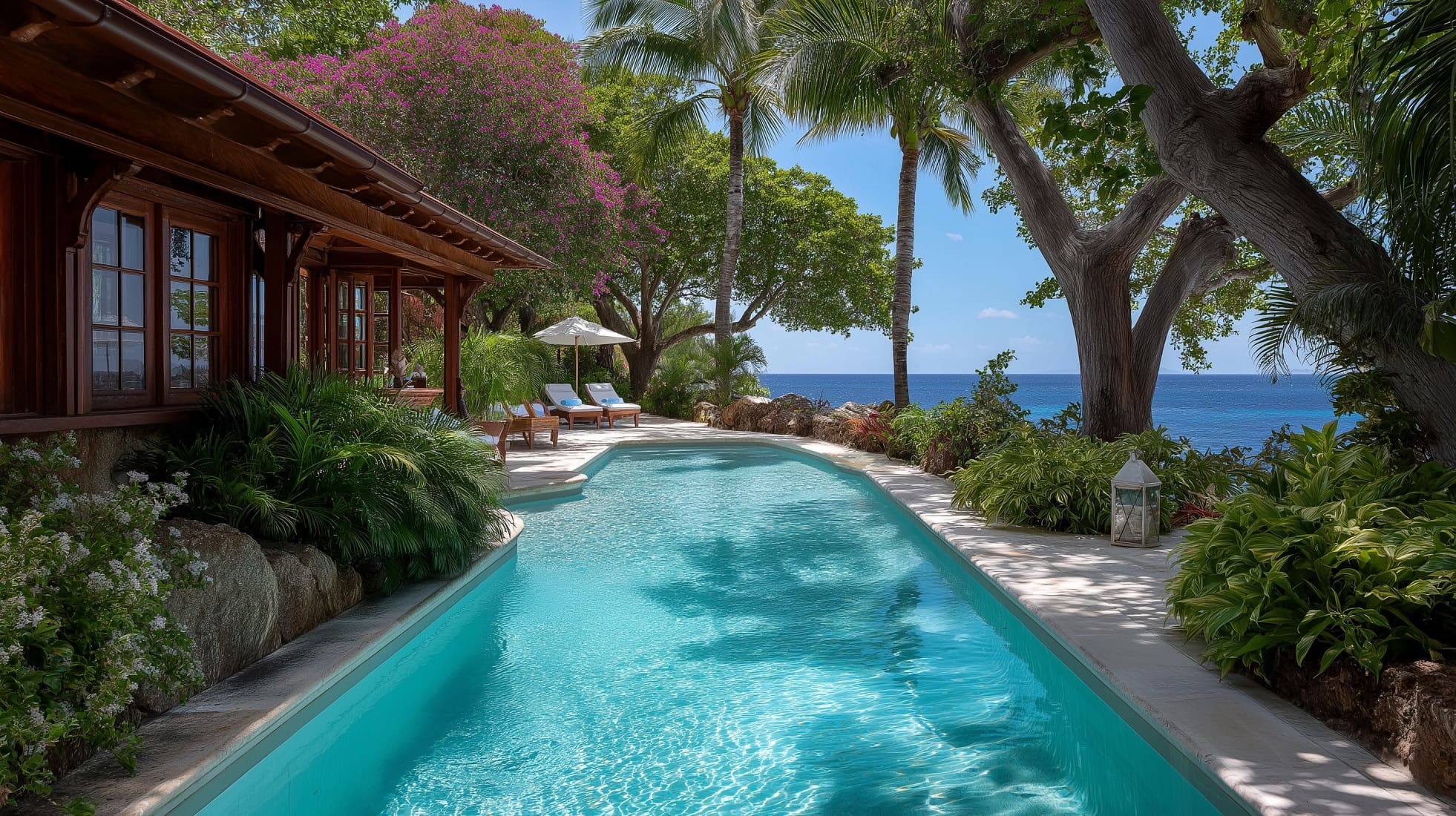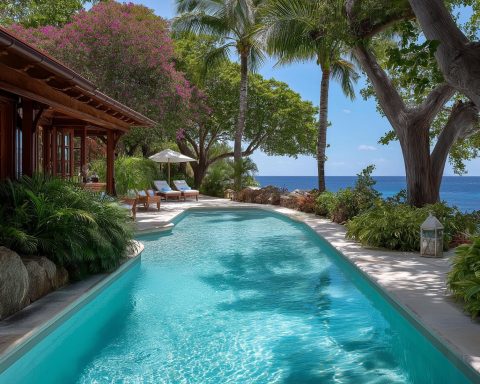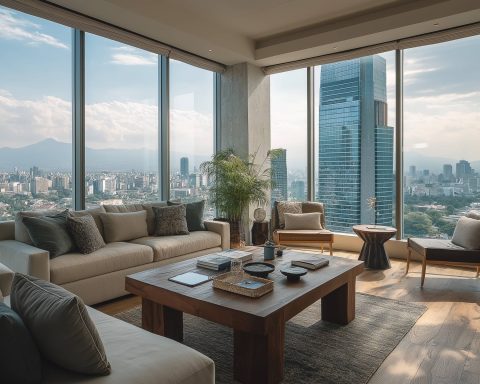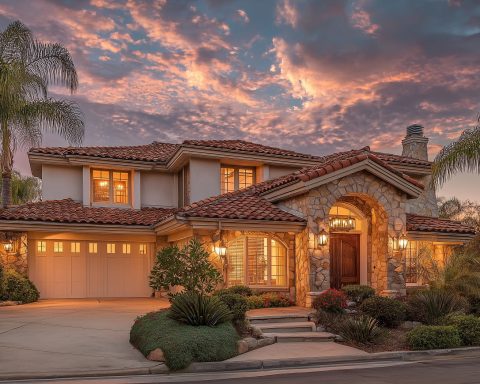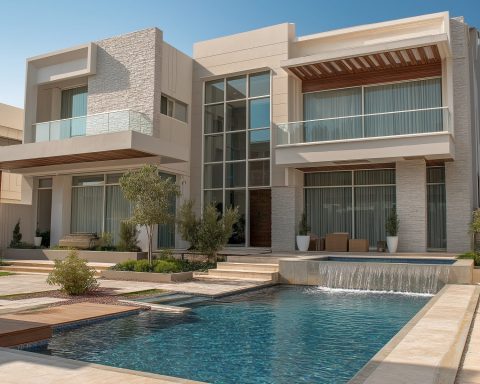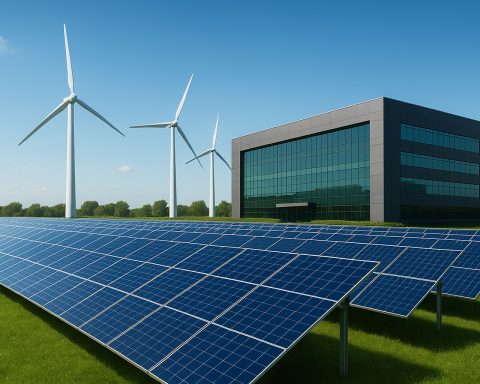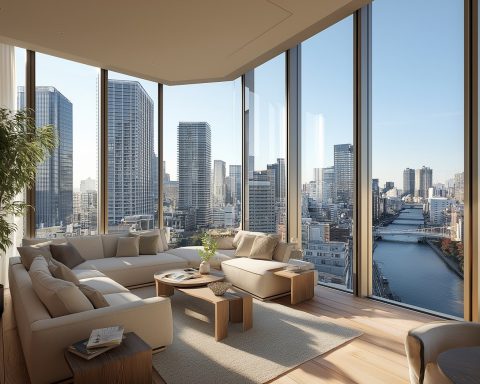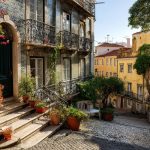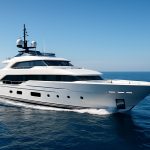Mustique’s Geography and Exclusive Luxury Appeal
Mustique is a private island in the nation of St. Vincent & the Grenadines (SVG), spanning about 1,400 acres in the Grenadines archipelago thegrenadinescollection.com. Renowned for its pristine beaches (like the famed Macaroni Beach) and lush hills, the island offers seclusion and natural beauty surrounded by protected reefs thegrenadinescollection.com. Mustique is wholly owned and managed by The Mustique Company, which strictly limits development to around 100 villas (only ~72 exist today) to preserve its unspoiled character thegrenadinescollection.com. This careful planning means no high-density resorts or condos – just expansive private estates discreetly nestled in the landscape.
Historical Cachet: Mustique first gained prominence in 1960 when Britain’s Princess Margaret was gifted a 10-acre parcel by then-owner Colin Tennant (Lord Glenconner) knightfrank.com. Her villa’s glamour drew a coterie of celebrities – from rockstars like Mick Jagger and David Bowie to fashion icons and even royalty such as Prince William – establishing Mustique’s reputation as an A-list hideaway businessinsider.com. To this day, the island remains synonymous with ultra-high-end leisure and privacy. Paparazzi are banned and security is tight, enabling royals, rock stars, business moguls and celebrities to mingle in relaxed anonymity businessinsider.com. This exclusive legacy underpins Mustique’s allure in the luxury real estate market.
Privacy and Security: A key selling point of Mustique is its unparalleled security and serenity. The island is patrolled by its own security force, and it’s famously said that there are “no locks on the doors” – a testament to the zero-crime environment content.knightfrank.com. Every visitor is registered before arrival, and outsiders cannot enter without prior approval, ensuring residents complete peace of mind mustique-island.com. The Mustique Company controls the airport, seaport, and essentially all island operations, creating a self-contained safe haven content.knightfrank.com. This level of control and privacy is exceedingly rare and positions Mustique as one of the safest and most private enclaves in the world for homeowners content.knightfrank.com.
Mustique’s geographic location also offers practical advantages. It lies just south of the typical hurricane belt, reducing storm risks (though contingency plans are in place for the unlikely event of a hurricane) mustique-island.com. The island is accessible via charter flights from nearby hubs (e.g. Barbados or St. Lucia) on the island’s own Twin Otter aircraft, as well as by private yacht knightfrank.com knightfrank.com. Regular visitors enjoy a tight-knit community vibe – with gatherings at the legendary Basil’s Bar and annual festivals – all while the island maintains a low-key atmosphere free of cruise ships or day-tour crowds. In sum, Mustique’s geography and exclusivity – a remote tropical paradise with first-class amenities yet tightly controlled access – firmly establish it as a trophy destination in the global luxury real estate market.
Current Real Estate Landscape (2025): Limited Supply and Trophy Properties
In 2025, Mustique’s real estate market remains ultra-exclusive and characterized by extremely limited supply. With only around 100 villa plots on the entire island (and fewer than that actually developed), buying opportunities are scarce by design content.knightfrank.com content.knightfrank.com. Typically only 3–5 properties (3–5% of inventory) trade hands in a given year content.knightfrank.com. All sales are handled discreetly via The Mustique Company in partnership with Knight Frank, the exclusive international agent for the island knightfrank.com. There is no public Multiple Listing Service – any availability is often shared quietly among high-net-worth networks. As one agency notes, Mustique has “finite annual property sales,” which are kept understated and off-market to preserve privacy knightfrank.com.
Property Types: Real estate on Mustique consists almost entirely of lavish villa estates. There are no condos or modest homes here – each property is a bespoke villa, often set on multi-acre lots with private pools and guest cottages. Many villas were originally designed by noted architects (e.g. the late Arne Hasselqvist, who helped craft the island’s unique architectural aesthetic) thegrenadinescollection.com. Styles range from charming Caribbean gingerbread houses to sleek contemporary pavilions, but all are built to luxury standards – with features like infinity pools, lush gardens, and panoramic ocean views thegrenadinescollection.com. Most villas come fully furnished and staffed, and many participate in the island’s rental program when not occupied by owners (more on rentals below).
Pricing Levels: Mustique commands some of the highest residential real estate prices in the Caribbean, on par with the world’s top luxury markets. As of late 2024, prime villa prices on Mustique ranged roughly from $2,500 to $7,000 per square foot content.knightfrank.com – several times higher than in larger markets like Barbados or the Bahamas (where prime prices cap around $1,000–$2,100 per sq. ft.) content.knightfrank.com. In absolute terms, entry-level homes (often 2–3 bedroom villas on ~0.5 acre) are about $6 million at minimum content.knightfrank.com. The majority of sales fall in the roughly $5 million to $15 million range, which in recent years were snapped up by younger buyers migrating during the pandemic content.knightfrank.com content.knightfrank.com. However, most villas on Mustique are valued between ~$15 million and $30 million, especially larger estates with prime views content.knightfrank.com. For context, a 3-bedroom “starter” villa at $6M on Mustique costs what a flagship 6-bedroom beachfront home might cost on other luxury islands – illustrating Mustique’s price premium.
Market Trends: The market experienced a significant COVID-era boom: nearly 20% of the island’s homes changed hands during 2020–2021 lockdowns, as some older owners sold and wealthy younger families flocked in seeking safe refuge content.knightfrank.com. This sudden turnover drove values up by as much as +25% during the pandemic surge content.knightfrank.com. Villas that might have sold for $5–6M pre-2020 were fetching $7–10M+ by 2022 as demand outstripped the tiny supply. By 2023–2025, however, the market has leveled off at a high plateau. According to Mustique’s managing director Roger Pritchard, the earlier value spike “has now trailed off, mainly because so few properties are changing hands” content.knightfrank.com. In other words, the new cohort of owners are holding onto their homes, resulting in very limited inventory for sale – which in turn is supporting prices at their elevated post-surge levels content.knightfrank.com. Knight Frank’s 2025 outlook noted that sales activity in Mustique is expected to remain roughly flat (no major change) compared to 2024, given the chronic supply shortage content.knightfrank.com content.knightfrank.com.
Despite the low transaction volume, buyer interest remains high. Mustique routinely sees far more demand than available listings, creating quiet competition for any villa that does come to market. Turnover is often driven by life events (estate sales, etc.) rather than speculative flipping. When a property is offered, it tends to move quickly if priced appropriately, thanks to a backlog of HNWIs waiting for a piece of this exclusive paradise. Notably, most recent sales have been in the $5–$15 million bracket, aligning with younger affluent families’ preferences content.knightfrank.com. Higher-priced villas above $20M trade infrequently, as they are often legacy estates held for decades.
This palatial 17.5-acre compound – boasting nine bedrooms, multiple pools, and its own staff quarters – was listed in 2023 with a price tag of about $200 million businessinsider.com businessinsider.com. Marketed as one of the world’s most expensive homes, The Terraces underscores how ultra-high-end Mustique’s market can be. While such trophy listings are exceptional outliers (typical top-tier villas peak in the $30M range worldpropertyjournal.com), they garner global attention and cement Mustique’s status at the apex of Caribbean luxury. As Knight Frank’s Edward de Mallet Morgan remarked, “If Mustique is the quintessential private island paradise, The Terraces [being the largest estate] is arguably one of the world’s foremost homes.” businessinsider.com Even if few buyers exist at the $200M level, the halo effect of these marquee properties reinforces overall demand. In practice, Mustique’s “average” luxury villas (if anything about Mustique can be called average!) tend to sell in the eight-figure range, and the island consistently commands the region’s top $/sq.ft. prices.
Current Availability: As of mid-2025, only a handful of villas are on the market. Many are listed as “Price on Application” given the discretion involved, but one publicly noted offering is a 5-bedroom hilltop villa around $25 million knightfrank.com knightfrank.com. Generally, active listings often include a few large legacy estates (in the $20M+ range) and perhaps one or two smaller homes if any owners are divesting. For those determined to buy into Mustique, patience and networking are key – prospective buyers typically register interest with the Mustique Company or Knight Frank and wait for an opportunity. In the interim, many rent villas on the island to experience the lifestyle (and indeed, renting is the primary way Mustique is “accessible” to non-owners; more below).
Rental Market: A notable aspect of Mustique’s real estate landscape is its thriving villa rental market, which can appeal to investors or second-home owners aiming for some rental yield. A large number of villas are available for short-term let when owners are absent, usually through the island’s centralized rental program thegrenadinescollection.com. Demand from affluent vacationers is very strong – during high season, villas often book out completely, with weekly rental rates typically starting around $10,000+ and climbing to $40,000–$100,000 per week for the grandest estates thegrenadinescollection.com mustique-island.com. For example, “Sundance,” a 6-bedroom villa, rents for about $40k/week in low season and $55k/week in winter mustique-island.com. Many owners cover a substantial portion of annual upkeep by renting out their homes for just a few peak weeks. It’s reported that Mustique’s short-term luxury rentals can yield gross returns of roughly 5–7% annually on a property’s value mlz.co.il mlz.co.il – quite healthy for ultra-prime real estate. This rental demand is driven by Mustique’s prestige and the exclusivity of access (only paying guests or owners can stay on-island), and it provides a nice income stream for owners who choose to participate. Nonetheless, some owners never rent their villas, prioritizing privacy over revenue. Overall, the robust rental scene indicates the depth of demand for the Mustique lifestyle beyond the small ownership circle.
In summary, Mustique’s 2025 market is defined by scarcity and stability at high price points. Prices remain near record highs after the pandemic-era jump, propped up by limited supply and unwavering appeal to elite buyers. The typical property for sale is a multi-million-dollar villa that promises not just a home, but entry into one of the world’s most exclusive communities. As we’ll see, the profile of buyers and the outlook for coming years both reflect these unique market fundamentals.
Buyer Demographics and Investment Trends
Mustique’s real estate is almost exclusively the domain of ultra-high-net-worth individuals (UHNWIs) seeking a private retreat or trophy vacation home. The island does not attract speculative flippers or mass-market investors – it’s largely bought by people for personal use (family retreats, holiday homes) with investment often a secondary motive (though long-term appreciation has been strong).
Who is Buying (Nationalities): Mustique has a diverse international buyer base, but historically and currently it has a strong Commonwealth and European influence. According to Knight Frank, the top three buyer origins for Mustique’s prime property in 2024 were: #1 the UK, #2 the US, and #3 other EU countries. British buyers have deep roots here (owing to Mustique’s British ties and appeal to UK aristocracy and business elites), while wealthy Americans also comprise a significant share, alongside some European (e.g. French, German) investors. Notably, this differs from some other Caribbean markets – for instance, in Barbados the UK also ranks #1, whereas in nearby Bahamas Americans dominate purchases【35†look 0 134】【35†look 0 195】. For Mustique, Canadians and other nationalities do appear but are not as prevalent in recent prime sales. Overall, the typical buyer is an international millionaire or billionaire drawn from North America or Europe, rather than regional locals.
Buyer Profile and Motivations: Within this rarefied group, Mustique buyers generally fall into a few categories:
- Business Magnates and Entrepreneurs: Many owners are self-made millionaires or billionaires (finance, tech, etc.) looking for a prestigious sanctuary to unwind with family or entertain guests. The privacy and security are huge draws for this set (no paparazzi or security worries) businessinsider.com. Mustique’s cachet among the global elite makes owning a villa a status symbol in itself.
- Celebrities and Public Figures: As noted, rock and pop stars, Hollywood actors, and even royalty have been among Mustique’s homeowners businessinsider.com. This trend continues – high-profile figures are attracted by the island’s low-key luxury (they can socialize at island cocktail parties without tabloid intrusion) and the sense of community with like-minded elites. Recent years saw an influx of younger wealthy individuals – e.g. tech entrepreneurs or entertainment industry figures in their 40s – who purchased villas as older long-time owners decided to sell during the pandemic content.knightfrank.com.
- Multi-Generational Wealth: Some villas are owned by families that span generations. For example, a property might be purchased by parents in their 50s or 60s with the intent to use it as a gathering spot for children and grandchildren on holidays. The emphasis on family-friendly safety (no crime, controlled environment) and on-island activities (e.g. tennis club, watersports, equestrian center) makes Mustique ideal for multi-generational vacation compounds.
- Investors/Second-Home Seekers: A smaller subset of buyers are those eyeing long-term investment potential alongside personal use. They are typically HNWIs who may rent out the villa part of the year for yield. With luxury Caribbean property values rising and Mustique’s legendary supply constraints, these buyers see a solid store of value. The fact that SVG has no capital gains tax (more on tax later) also means any price appreciation is not eroded by local taxes on resale ifcreview.com. That said, pure investors (with no intention to ever use the home) are rare – Mustique’s market is not liquid enough for short-term trading, so buyers usually have lifestyle motivations at the forefront.
Trends in Demand: Over the past few years, demand for Mustique property surged for several reasons:
- Pandemic “Safe Haven” Effect: During COVID-19, wealthy individuals sought secluded getaways. Mustique, with its private isolation and rigorous entry protocols, was extremely attractive. Many deals were driven by pandemic motivations – families realizing they could work remotely from paradise, etc. This trend brought in younger buyers (30s–50s) who might have otherwise waited to purchase a vacation estate, effectively accelerating a generational turnover on the island content.knightfrank.com content.knightfrank.com.
- Lifestyle and Remote Work: Even beyond the pandemic, the rise of remote work and emphasis on lifestyle is driving HNWIs to invest in places like Mustique. Executives who can now work part-time from home find the idea of “home” being a Caribbean island plausible. The island’s excellent telecommunications and relatively easy private air access enable working from Mustique for part of the year. This has increased interest particularly from North American buyers looking to escape winter while still staying connected to business.
- Tax and Financial Appeal: The Caribbean’s tax-friendly regimes are a draw for footloose wealthy individuals. While some neighboring islands (Bahamas, Cayman, etc.) actively promote tax residency, Mustique’s SVG has its own perks: there are no estate/inheritance taxes, no capital gains tax, and no recurring property taxes on villas ifcreview.com horizonrealty.co.uk. This makes owning a multimillion-dollar asset more efficient in the long run. For those coming from high-tax jurisdictions (e.g. US, UK, Canada are raising taxes on the wealthy), parking wealth in Caribbean real estate is seen as advantageous worldpropertyjournal.com worldpropertyjournal.com. Additionally, SVG’s currency (East Caribbean dollar) is pegged to the US dollar, and most Mustique transactions are in USD, reducing currency risk for American buyers.
- Exclusivity and Legacy Factor: Simply put, there is only one Mustique. The island’s mystique (no pun intended) and the A-list association continue to lure new buyers who want to join the exclusive “club” of Mustique homeowners. It’s akin to owning a piece of a very limited edition asset. This exclusivity tends to insulate demand from typical market fluctuations – there will almost always be billionaire-interest as long as the island maintains its reputation. Some buyers hold their Mustique home as a family legacy asset (passed down rather than sold), further constraining available supply and keeping demand pressure high.
- Second-Home Lifestyle Trend: Globally, wealthy individuals are increasingly allocating more of their portfolio to luxury second homes and retreat properties (a trend confirmed by Knight Frank’s surveys worldpropertyjournal.com). Mustique benefits from this trend as one of the top choices for a Caribbean second home among those who can afford the very best. It competes with the likes of St. Barts, Aspen, the South of France, etc., as a lifestyle investment.
In terms of buyer demographics, Knight Frank notes that many of the new Mustique buyers post-2020 were younger affluent families with children content.knightfrank.com. These families often value the island’s community (there’s a kids’ village, social events, etc.) and safety. The local international school options are limited (most Mustique owners fly their kids elsewhere for schooling), but for vacation periods the environment is ideal for kids. Meanwhile, older generations (60s–70s) who were early Mustique owners have gradually been exiting, either for estate planning or because they spend less time there, making room for the next generation of owners.
Another interesting trend is the continued strong interest from remote buyers. Real estate agents report that some wealthy clients even bought properties sight-unseen via virtual tours or Zoom during the pandemic boom worldpropertyjournal.com worldpropertyjournal.com. This underscores the level of trust in Mustique’s market and the urgency some felt to secure a property there when inventory popped up. While site-unseen purchases are less common in 2025, international buyers remain very active – often flying in for a short visit to view a villa as soon as they hear it might be available.
Overall, Mustique’s buyer pool in 2025 is best described as global billionaires and multi-millionaires prioritizing privacy, lifestyle, and long-term value. They are typically seasoned luxury property owners (often with portfolios of homes in multiple locales) and thus compare Mustique against other elite enclaves. Next, we’ll explore how Mustique stacks up to a few of those other island markets that often feature in these buyers’ considerations.
How Mustique Compares to Other Luxury Island Markets
Mustique exists in a broader constellation of Caribbean high-end real estate destinations, each with its own flavor. Here we compare Mustique with three notable peers: St. Barts, Anguilla, and Barbados, focusing on appeal, pricing, and regulations.
St. Barts (Saint Barthélemy) – Glamorous French Caribbean Enclave
Appeal: St. Barts is often mentioned in the same breath as Mustique for attracting the jet-set and celebrities. This French island (about 8 square miles) offers a cosmopolitan, upscale lifestyle – think designer boutiques, gourmet dining, and a vibrant social scene that peaks around New Year’s Eve. St. Barts combines natural beauty (gorgeous beaches and hills) with a bit more buzz than sleepy Mustique. It’s a hub for mega-yachts and hosts many high-profile events. Privacy is valued (many villas are secluded in the hills), but the island overall has more tourism and nightlife than Mustique’s tranquil vibe.
Real Estate Pricing: Property prices in St. Barts are among the highest in the world jhmarlin.com. Thanks to extremely limited land and relentless demand for second homes, St. Barts villas routinely command multi-million dollar prices. A small three-bedroom villa can easily exceed $5 million, and prime estates often sell for $10–20+ million. In recent years, record sales have approached $40–50 million USD for exceptional properties with expansive acreage or beachfront. As one agency notes, “the cost of real estate [in St. Barts] is much more expensive compared to other destinations” due to limited supply and high demand jhmarlin.com. The island saw its own pandemic-era boom, with values appreciating and practically no inventory available at the low end. Unlike Mustique, St. Barts does have a mix of property types – including some condominiums and smaller apartments in Gustavia – but even those are pricey by normal standards (often $1M+ for a small unit). Overall, St. Barts and Mustique are comparable in that they both top Caribbean price charts, though St. Barts has a broader range (from high-end condos to ultra-luxe villas) whereas Mustique’s market starts at a higher entry point (no “cheap” options at all).
Regulations: As a French overseas collectivity, St. Barts imposes no restrictions on foreign ownership – anyone can buy real estate there jhmarlin.com jhmarlin.com. Transactions are handled by French notaries. Closing costs for buyers are roughly 6–7% of the purchase price, covering notary fees and registration taxes jhmarlin.com jhmarlin.com. Importantly, St. Barts has no annual property tax – a unique tax advantage; owners pay an annual “occupancy” fee (taxe d’habitation) but there is no recurring property or wealth tax on real estate jhmarlin.com. There is also generally no capital gains tax in St. Barts after a certain holding period, making it financially attractive. In summary, it’s straightforward for foreigners to buy and hold property in St. Barts, with a relatively low friction in taxes (much like Mustique/SVG’s tax-free holding, though in SVG one must get a license).
Summary: Buyers choosing between Mustique and St. Barts often decide based on lifestyle preferences. Mustique offers ultimate privacy and a closed community; St. Barts offers privacy plus a chic, culturally rich environment (with fine dining, shopping, and famous beach clubs like Nikki Beach). Both are extremely expensive and limited in supply. Some HNW individuals own in both locales. From an investment perspective, St. Barts has historically seen very strong appreciation and high rental demand – top villas can rent for astronomical sums (reports of $100k per week in peak season for certain St. Barts estates are not uncommon jhmarlin.com). Mustique’s rental yields are also strong, but St. Barts’ more developed tourism means even higher rental occupancy potential. In terms of ease of ownership, St. Barts’ lack of foreign buyer hurdles is a plus, whereas Mustique requires a license and board approval – but conversely, Mustique’s structure ensures a tight-knit owner community and carefully vetted neighbors. Ultimately, both represent the pinnacle of Caribbean luxury real estate: Mustique for those who want a private island club; St. Barts for those who want a bit of St. Tropez in the tropics.
Anguilla – Low-Key Luxury with Regulatory Hurdles
Appeal: Anguilla is a British Overseas Territory known for its serene, low-key atmosphere and stunning white-sand beaches. Compared to Mustique or St. Barts, Anguilla is flatter (no high hills) and more sparsely populated. It lacks the bustling tourism of St. Barts, positioning itself as a tranquil retreat with ultra-luxe resorts (like Four Seasons and Cap Juluca) and private villas. There’s no cruise ship port or high-rise development – the island prizes peace and exclusivity, albeit in a more open way than Mustique (Anguilla isn’t private; it’s a public island of ~15,000 residents). Buyers in Anguilla are often drawn by the beautiful beaches, the friendly local culture, and a growing luxury infrastructure (golf clubs, beach clubs, fine dining, etc., albeit on a smaller scale). It’s slightly off the beaten path – accessible via St. Martin – which keeps it quieter.
Real Estate Pricing: Anguilla’s property market features high-end villas and some resort residences. Prices are high but generally below Mustique/St. Barts levels. Luxury villas in Anguilla often range from around $3 million up to $10–15 million for the most exclusive beachfront estates. For instance, a flagship 8-bedroom beachfront villa was recently listed at $14.5 million USD thegrenadinescollection.com, indicating the upper end. There are also development parcels and smaller homes that can be had for under $2M, which one would never find on Mustique. In essence, Anguilla offers a bit more value per dollar in the ultra-luxury segment – you might get a larger beachfront for $5M in Anguilla, whereas $5M on Mustique might only buy a smaller inland villa (if anything). However, Anguilla’s top properties still command hefty sums (and a few have approached $20M). The market saw price appreciation during the pandemic as well, with increased interest from North American buyers. But with more land area and development potential than Mustique, Anguilla’s supply is not as fixed; new villas and projects (like a current cluster of luxury villas on the West End) add inventory gradually, helping to moderate price extremes somewhat.
Regulations: Anguilla, like many British Caribbean territories, requires foreign buyers to obtain an Alien Landholding License (ALHL) to purchase property. This process is similar to SVG’s, involving a background check and government approval. The license comes with significant fees – typically 12.5% of the property value for the license stamp duty, plus 5% transfer tax, so roughly 17.5% in transaction taxes anguilla-beaches.com for a foreign buyer. (Anguilla also historically required a refundable construction bond of 10% for land purchases to ensure you build within a timeframe anguilla-beaches.com.) These costs make acquiring property in Anguilla relatively expensive upfront, akin to SVG’s ~16% total closing costs for foreigners. However, once acquired, Anguilla imposes low annual property taxes (it has a modest annual property tax based on property value, but no personal income tax). There are some development conditions for license holders (e.g. if buying undeveloped land, one must build a home within a certain period or face penalties, to prevent land banking) anguilla-beaches.com. Overall, the regulatory environment is a bit bureaucratic but meant to ensure foreign investment benefits the island (much like SVG’s approach). There are no restrictions on rental – in fact Anguilla even has a Villa Rental Law requiring foreign owners who rent out their villas to use a local agent, to keep oversight anguilla-beaches.com.
Summary: Anguilla competes with markets like Turks & Caicos and the Cayman Islands as a preferred choice for luxury beachfront living, especially for Americans. Compared to Mustique, Anguilla is more accessible and has more real estate offerings at various price points – but it lacks the singular private-club exclusivity. Buyers who prioritize a quiet island with world-class beaches and are okay with a bit more interaction with normal island life might prefer Anguilla. From an investment angle, Anguilla’s property values have been rising due to its reputation and limited development approach, though perhaps not as steeply or uniformly as Mustique’s ultra-limited supply. Anguilla’s foreign buyer costs (17.5% tax) are actually a tad higher than Mustique/SVG’s ~10% license +5% stamp, but in both cases, a foreign purchaser needs to factor in high upfront taxes. For some, Anguilla’s advantage is that it has established luxury resorts and services (one can enjoy fine dining at hotels, etc., whereas Mustique has just one boutique hotel and relies on the villa lifestyle). In essence, Anguilla offers a more traditional home ownership model (you integrate into a broader island community, albeit at the high end), whereas Mustique is owning part of a curated private island. Many UHNW buyers will evaluate both depending on whether they want total seclusion (Mustique) or a more traditional but still exclusive island (Anguilla).
Barbados – Established, Accessible High-End Market
Appeal: Barbados differs from the other islands mentioned in that it’s a larger, fully developed nation (with over 280,000 population) and has a long history as a vacation and second-home destination for the wealthy. Its pluses include a stable government, strong infrastructure (international airport with many flights, good healthcare facilities, etc.), and an ingrained luxury tourism industry. The platinum West Coast of Barbados (areas like Sandy Lane, St. James, and St. Peter) is renowned for upscale villas and beachfront estates, attracting wealthy Brits, Canadians, and other internationals for decades. Barbados offers more amenities and social life off-property – including world-class golf courses, restaurants, polo clubs, and shopping – giving it a lively year-round expat community. For buyers who want a mix of luxury and a vibrant island culture (and perhaps a place to spend several months a year more comfortably), Barbados is appealing.
Real Estate Pricing: Barbados has a wide range of property options – from condos and townhouses in the few hundred thousands (USD) to ultra-luxury estates. On the high end, Barbados can approach Mustique-like prices for prime beachfront mansions. According to Knight Frank, prime property in Barbados typically costs $500–$1,000 per square foot content.knightfrank.com – expensive, but only a fraction of Mustique’s $2,500+ per sq.ft. Ultra-luxury villas on Barbados’s West Coast have sold in the $15–$30 million range (for example, estates in Sandy Lane or compounds in St. Peter). However, the average luxury home in Barbados is generally cheaper than in Mustique. Knight Frank’s 2024 research noted that Barbados saw new demand highs post-pandemic, with top-end $20M+ properties in strong demand and very limited supply of prime beachfront land remaining worldpropertyjournal.com worldpropertyjournal.com. In fact, local agents report that large beachfront parcels are “nearly impossible to find” now worldpropertyjournal.com, forcing developers to turn to second-tier “just off beach” locations. This suggests that Barbados’s prime market is maturing with rising prices, but it still has more volume and liquidity than tiny Mustique. Notably, Barbados offers options like luxury condos and villas in resort communities (e.g. Royal Westmoreland, Apes Hill) at price points from $1–5M, which attract well-to-do retirees or second-home owners who might not reach Mustique’s stratospheric entry point. Thus, Barbados captures a broader segment of the affluent market. It also means that while Mustique is reserved for the ultra-rich, Barbados has both ultra-rich and merely moderately rich buyers driving its market.
Regulations: Foreigners face no restrictions on buying property in Barbados morrislegal-bb.com. The process is straightforward, with purchases typically done in foreign currency registered at the central bank (to ensure easy repatriation later). Importantly, Barbados does not require any special license or government consent for a foreigner to buy freehold land or homes – it’s an open market. The transaction costs are also favorable for buyers: the seller traditionally pays the transfer taxes (which are 2.5% transfer tax + 1% stamp duty) on a sale worldwidedreamvillas.com withersworldwide.com, so the buyer’s tax outlay is effectively zero (buyers only incur legal fees, usually ~1-2%). This means closing costs for a foreign buyer in Barbados are minimal compared to Mustique/SVG or Anguilla. Barbados does have an annual property (land) tax, which is on a sliding scale by property value (with higher-value properties paying around 0.7% on value above certain thresholds, and the first portion exempt or at low rate) igrealty.com. While not zero, these annual taxes are often a minor consideration for luxury owners, especially compared to say US property taxes. Barbados also imposes no capital gains tax on property, although if one becomes a tax resident there, worldwide income could be taxable (but many overseas owners are not tax resident, just property owners). Overall, Barbados offers a very investor-friendly legal framework: easy purchase, secure title (British legal system), and the ability to own through offshore companies or trusts if desired for tax planning luxecaribbeanproperties.com.
Summary: Barbados provides a somewhat different proposition than Mustique. It’s less exclusive by nature (being a larger and public island), but still has pockets of extreme luxury. Buyers who want more infrastructure, ease of access (direct flights from London, New York, etc.), and perhaps a more active social scene often choose Barbados. It’s common for wealthy individuals to own a home in Barbados where they spend significant time and entertain, versus Mustique which might be used more sparingly for true getaways. From an investment standpoint, Barbados’s market is broad and relatively liquid – there are always international buyers for well-located West Coast properties, and the island’s overall economy and real estate values have been on an upswing as tourism rebounds. Knight Frank’s 2025 insight indicates Barbados expects prices to “rise slightly” going into 2025 content.knightfrank.com, reflecting confident demand. Mustique’s outlook was “no change” in activity, but that’s more due to no supply than lack of demand content.knightfrank.com. Both markets are stable or rising. The key difference is that Barbados is an open, functioning country where one can seamlessly live and integrate, whereas Mustique is a niche private community. For ultra-wealthy investors, Barbados might complement Mustique: one could have a primary winter home in Barbados (with conveniences like international schools or golf and business services) and a more private escape in Mustique. Each island has its niche – Barbados is the refined but lively grande dame of Caribbean luxury real estate, while Mustique remains the remote crown jewel for absolute exclusivity.
Legal and Tax Framework for Foreign Investors in Mustique (SVG)
Investing in Mustique property involves understanding St. Vincent & the Grenadines’ laws for foreign ownership, as well as the tax implications. SVG is known to be welcoming to foreign investors, but it maintains certain regulations to control land ownership.
Alien Landholding License (ALHL): Foreigners must obtain an Alien Landholding Licence to purchase property in St. Vincent & the Grenadines horizonrealty.co.uk horizonrealty.co.uk. This license is a legal prerequisite for any freehold (or long leasehold) acquisition by a non-citizen. The process is as follows:
- Application: The buyer, through a local attorney, applies to the Ministry of National Security for the ALHL horizonrealty.co.uk. The application involves providing personal documents (police background check, financial references, identification) for due diligence horizonrealty.co.uk. Essentially, SVG authorities vet the foreign buyer’s background – part security measure and part anti-money-laundering compliance mlz.co.il. In Mustique’s case, The Mustique Company will typically facilitate this process and ensure the buyer meets any island-specific criteria as well (Mustique’s Board likely informally approves potential owners as suitable for the community).
- Timeframe: Obtaining the ALHL in SVG takes roughly 3–6 months on average horizonrealty.co.uk. Investors should plan for this waiting period; you cannot close on the property until the license is granted. However, a sale agreement can be signed contingent on license approval, with a deposit paid.
- Cost: The Alien Landholding Licence comes with a one-time fee of approximately 10% of the property’s value horizonrealty.co.uk horizonrealty.co.uk. This is a substantial additional cost – for example, a $10 million villa would incur about $1 million in ALHL fees. It’s effectively a government tax for the privilege of foreign ownership. (This rate is comparable to other islands: e.g., Antigua charges 7.5%, Anguilla ~12.5%, etc.)
- Approval: License approval is generally granted unless the property is deemed sensitive (e.g., near strategic infrastructure) or if there’s a red flag in the buyer’s background horizonrealty.co.uk. Since Mustique is a private island, and purchases are pre-screened, refusals are rare. Once approved, the license is specific to the property – if the buyer later purchases another property, a new license would be needed.
Stamp Duty and Closing Costs: In SVG, there are transfer taxes on property transactions, usually split between buyer and seller. The stamp duty on the deed is 5% of the price; by convention the seller pays this 5% in SVG horizonrealty.co.uk (though terms can vary). Additionally, the seller pays a 10% transfer tax to the government on the sale (this is for citizens; for foreigners selling, it can be higher). From the buyer’s perspective, aside from the ALHL fee (~10%), they pay their attorney (1-2%) and some small registration fees horizonrealty.co.uk. In practice, the total transactional cost for a foreign buyer in Mustique is roughly ~15–16% of the purchase price when all fees are tallied eracaribbean.com. This includes the ALHL, legal fees, and share of stamp duties, etc. – similar to Anguilla’s ~17.5% and higher than zero in Barbados.
One should also note real estate agent commissions are typically 5% and usually paid by the seller in SVG horizonrealty.co.uk. But in Mustique’s case, The Mustique Company/Knight Frank handle sales, and it’s likely structured in a similar way (seller’s cost).
Ownership Structure: Foreigners in SVG can own property outright in their name or via a corporation. There is no requirement to have a local partner or anything (unlike some Asian countries). Many buyers use an offshore company or trust to hold the property for privacy or estate planning. The legal system is based on British common law, so property rights are well-protected and titles are registered at the Land Registry. Mustique’s situation is unique in that effectively one becomes a shareholder of The Mustique Company (each homeowner has a share in the company that runs the island). Buying a property likely means the buyer also joins The Mustique Company as a member/shareholder, agreeing to abide by its rules (which cover architectural guidelines, island regulations, fees for communal services, etc.). It’s important for a buyer’s lawyer to review the company’s charter and homeowner covenants.
Taxes on Property Ownership: Here SVG shines as a tax-friendly jurisdiction:
- No Annual Property Tax: SVG does not levy annual property or land taxes on private residential properties (used for non-commercial purposes) horizonrealty.co.uk. So unlike the US or Europe, you won’t get a yearly property tax bill based on assessed value – holding cost is lower. (There might be a modest charge if the property is used commercially, but Mustique villas used only by owners or for short-term rental shouldn’t have annual local taxes).
- No Capital Gains Tax: If you sell the property in the future, SVG does not tax capital gains ifcreview.com. Any profit goes entirely to the seller (though note, the seller would pay the 10% transfer tax on sale as mentioned). Many foreign owners structure ownership via an offshore company and can potentially sell the company shares to a buyer to avoid some transfer taxes – but that’s a complex subject beyond our scope. The key is, SVG won’t tax your gain as income.
- No Inheritance or Wealth Taxes: SVG imposes no estate or inheritance taxes, and no personal wealth taxes ifcreview.com. This is attractive for estate planning – you can pass the Mustique villa to heirs without the government taking a cut (aside from possibly small probate fees). Some other jurisdictions might levy estate duties; SVG does not.
- Income Tax: SVG’s income tax would only apply if you or the property generate income in SVG. Rental income from a Mustique villa could be subject to SVG income tax, theoretically. However, many owners route rentals through external entities. If one becomes a fiscal resident of SVG, then worldwide income could be taxable up to 30%. But very few choose to become tax residents here, as SVG currently has no citizenship-by-investment program and only grants residency separately (see below).
Residence and Citizenship: Buying property in SVG (even a very expensive one) does not automatically confer residency or citizenship horizonrealty.co.uk horizonrealty.co.uk. SVG notably does not have a Citizenship by Investment program, unlike some neighbors horizonrealty.co.uk. However, owning a substantial property can support a residency application. Foreign owners can typically obtain a temporary residence permit that is renewable annually, by showing they have sufficient means and ties (property ownership helps) horizonrealty.co.uk. After 5 years of continuous residency, one could apply for permanent residency horizonrealty.co.uk. But again, most Mustique owners use the island purely for visits and remain tax residents elsewhere. They don’t necessarily seek SVG immigration status beyond the standard visitor entry (which for many nationalities is easy and can be for several months).
Ongoing Costs and Responsibilities: Owners on Mustique will contribute to the island’s upkeep. The Mustique Company likely charges annual fees or assessments for infrastructure, security, staff services, etc. While we don’t have a published figure, it could be tens of thousands of dollars per year per owner to run the island’s facilities (medical clinic, security force, utilities, etc.). These fees are essentially the HOA (Homeowners Association) dues for living on a private island paradise. Additionally, maintenance of one’s villa (staff salaries, gardening, repairs) is a significant ongoing cost, though comparable to maintaining any luxury estate.
Prospective investors should also be aware of compliance and transparency: In recent years, SVG has tightened oversight to prevent money laundering through real estate mlz.co.il mlz.co.il. Large transactions will require clear source-of-funds documentation. This is standard for reputable buyers, but gone are the days of flying down with a suitcase of cash – transactions occur via bank wire through regulated institutions with due diligence.
In summary, the legal framework in Mustique/SVG is investor-friendly but with upfront barriers. Once you’ve paid the necessary license fee and taxes, you enjoy freehold ownership with no recurring local taxes and a stable legal environment. The regime is actually one of light ongoing taxation – effectively the government “takes its cut” at the time of purchase (and again if you sell via transfer tax on the seller side), but does not milk property owners annually. This, combined with the strong asset protection laws (SVG is a known offshore financial center historically), makes owning Mustique real estate appealing to those who plan carefully. Just remember to factor the ~15% acquisition cost into your investment budget. Working with an experienced local attorney (as well as Knight Frank and The Mustique Company) is crucial to navigate the license and registration steps smoothly horizonrealty.co.uk horizonrealty.co.uk.
Challenges and Risks of Buying Property in Mustique
While owning a home in Mustique is alluring, potential buyers should be mindful of some challenges and risks inherent to this unique market:
- Illiquid Market: Mustique’s blessing of limited supply can be a curse if you ever need to sell quickly. With only a handful of transactions per year, the market is relatively illiquid. It may take time to find the right buyer at your price, as the pool of people able to purchase $5M–$20M villas in a remote island is limited. Economic downturns or global crises could further thin out buyers, though Mustique’s ultra-wealthy demographic offers some resilience. In short, Mustique property should be viewed as a long-term investment/hobby rather than something for quick resale profit.
- High Entry and Exit Costs: As discussed, buying involves ~15% extra in fees (license, etc.), and selling will involve about 10% in transfer taxes and agent fees. These transaction costs mean you need significant price appreciation (or many years of enjoyment) to offset the friction. If you sell too soon, these costs eat into returns. Additionally, carrying costs like staff, maintenance, insurance (hurricane insurance is pricey even if storms are infrequent) add up. Mustique is for those with deep pockets to sustain a property that will likely cost several hundred thousand dollars a year to run, all-in.
- Hurricane and Natural Disaster Risk: Although Mustique lies south of the typical hurricane belt, it is not completely immune to tropical storms. Climate change could expand hurricane activity further south over time. A severe storm could damage infrastructure or homes. The island’s small size and distance from large islands means that in event of a natural disaster (like a hurricane or volcanic ash from St. Vincent’s volcano), logistical challenges in repairs and supplies could arise. Owners should maintain comprehensive insurance and disaster plans. The Mustique Company does have hurricane contingency protocols mustique-island.com, which is reassuring, but Mother Nature always poses some risk in the Caribbean.
- Maintenance and Management: Owning a remote island villa means dealing with logistical complexity for maintenance. All building materials, furnishings, even labor in many cases, must come from off-island (often via St. Vincent or Barbados). This can mean higher costs and longer timelines for construction or repairs. Skilled labor is limited on-island (though Mustique Company has maintenance staff). If something breaks, you might wait for a part to be flown in. Additionally, the salt air and tropical climate cause more wear-and-tear. Essentially, upkeep is challenging – unless you have a top-notch property manager (which most owners do, often provided via Mustique Co.). Before buying, one should inspect properties carefully for any deferred maintenance, and budget generously for ongoing upkeep in this environment.
- Governance and Rules: Buying into Mustique means agreeing to The Mustique Company’s rules and covenants. There may be restrictions on how you can use your property. For example, there might be limits on any further development or renovation (to maintain island aesthetic), rules about renting (rentals are usually allowed but likely coordinated through the official program), and expectations of behavior (Mustique has a famously laid-back but tight community – any owner must respect the privacy and tranquility of others). While these rules are mostly reasonable and preserve value, they mean you have less autonomy than in a typical locale. If an owner for some reason ran afoul of the community guidelines, it could be uncomfortable. Essentially there’s a “small community” dynamic – which could be a challenge if personality clashes occur (though rare, given everyone has a shared interest in maintaining paradise). The company also has the power to set fees for island services, so owners are somewhat beholden to those decisions.
- Economic and Political Factors: St. Vincent & the Grenadines is politically stable and has a good track record with property rights. However, any foreign investor should keep an eye on local regulations – e.g., could the government raise the Alien License fee further? Could currency fluctuations (the EC dollar is pegged to USD, so stable) or economic downturn in SVG indirectly affect services? These risks are low, but not zero. SVG has in the past increased scrutiny on offshore assets to meet global standards mlz.co.il; a very remote risk could be if international pressure forced changes in offshore finance that somehow impacted foreign property owners (again, unlikely directly).
- Opportunity Cost: Tying up a large sum in a vacation property means those funds aren’t invested elsewhere. Some buyers might consider whether renting a villa for a few weeks a year (even at $50k/week) is more cost-effective than owning (with all the fixed costs). The answer depends on usage and wealth level – for many UHNWIs, the intangible benefits of ownership (customizing the home, nameplate on the door, ability to visit on a whim, and pride of owning part of Mustique’s legacy) outweigh pure financial logic. But it’s worth considering that the rental option exists without the headaches.
- Environmental and Sustainability Issues: Mustique is committed to preserving its environment, but small islands can be ecologically fragile. Issues like freshwater supply, waste disposal, and reliance on diesel generators for power (if not mitigated by renewables) are long-term sustainability challenges. The island likely has systems in place (they do have desalination for water and generators, and some solar initiatives), but any serious environmental issue could affect property values. For example, coral reef health or beach erosion could, in a worst case, impact the island’s appeal over decades. That said, Mustique Company strictly limits development (only ~25% of the island is developed) thegrenadinescollection.com, which helps environmental resilience.
In weighing these risks, it’s clear that Mustique is best suited for buyers who are in it for the long haul and for the lifestyle rather than short-term investment returns. The challenges of illiquidity and high costs are offset by the unique reward of owning a slice of one of the world’s most exclusive islands. Most existing owners would argue the “priceless” factor – the experiences and prestige of Mustique – makes the challenges worth it. Nonetheless, prudent buyers will conduct due diligence: hire experienced lawyers, get thorough property inspections, understand all community fees and rules, and have contingency plans (for property management and emergencies). With eyes open to these considerations, one can mitigate many of the risks of owning in paradise.
Expert Perspectives and Recent Notable Sales
Local experts and seasoned agents often emphasize Mustique’s uniqueness in the global property market. Marketers describe Mustique as the pinnacle of luxury and privacy, with Knight Frank calling it “the most aspirational hideaway for discerning homeowners” among the super-rich knightfrank.com. The fact that Knight Frank has been affiliated with Mustique for 20+ years and serves as the exclusive agent speaks to the tailored approach needed for this market knightfrank.com. They don’t just sell real estate; they effectively vet and induct new members into the Mustique circle. James Archibald of Knight Frank (hypothetical example) might say that selling on Mustique is less about advertising and more about quietly matching the right buyer to the right villa, often through personal connections.
Roger Pritchard, Managing Director of The Mustique Company, has provided insights into the market’s post-pandemic dynamics. He noted that security and control are key selling points – “It’s a small private island that we have total control of… so there’s no crime. There are no locks on the doors… you can leave your phone on a bar”, highlighting an experience virtually impossible elsewhere content.knightfrank.com. Pritchard also observed the generational shift, with many older owners selling during COVID and younger families moving in, driving a ~25% surge in values content.knightfrank.com. Now, those new owners are “just not sellers”, resulting in the current inventory drought content.knightfrank.com. This perspective from the island’s management suggests the market’s tightness is likely to continue until another demographic change prompts sales.
From a real estate investment viewpoint, analysts point out Mustique’s role as an ultra-prime niche. Wealth reports often cite Mustique alongside only a handful of places (like Monaco or Capri) where $/sqft prices are off the charts due to scarcity and cachet. A Knight Frank research graphic comparing Caribbean markets showed Mustique’s pricing far above Barbados and Bahamas, and labeled Mustique’s 2025 outlook as stable (no change) while other markets might see slight growth content.knightfrank.com content.knightfrank.com – essentially saying Mustique has already hit such high levels that it’s in a holding pattern, constrained by limited trades. This aligns with expert sentiment that Mustique is less volatile: it doesn’t swing wildly in price because so few transactions happen and owners are not forced sellers. It’s more immune to regional oversupply issues or economic swings, functioning almost like its own micro-economy.
In terms of notable sales, because sales are private, few are publicized. However, one sale that drew international attention was the offering of “The Terraces” estate (discussed earlier). When it hit the market at $200 million in early 2023, press outlets called it “one of the most expensive homes for sale in the world,” noting that it “tops the list of expensive private homes in the Caribbean,” according to Knight Frank businessinsider.com. The Terraces is extraordinary for its scale – essentially a personal palace with 17½ acres of manicured grounds businessinsider.com – and it symbolizes Mustique’s upper echelon. By late 2024, the property was reportedly still on offer, with Knight Frank indicating they were in discussions with buyers from around the world businessinsider.com businessinsider.com. Whether it sells for near asking or at all remains to be seen, but its availability itself was newsworthy. Another villa that often gets mentioned is Princess Margaret’s former villa “Les Jolies Eaux,” which is part of Mustique lore. While that property was sold years ago (after the Princess’s family sold it, it went to a developer/owner who refurbished it), it occasionally comes up for rent. Its existence is a talking point for agents to illustrate the island’s heritage – “you can swim in the same pool as a royal” sort of appeal.
We also know that during the pandemic boom around 2020–21, roughly 20 villas changed hands content.knightfrank.com – a staggering number given the usual trickle of sales. Though individual deals weren’t public, this likely included some longstanding estates finally trading. It’s rumored that some high-profile individuals bought in that period (for example, there were whispers in the press about tech billionaires eyeing Caribbean retreats). Specific names are kept confidential by The Mustique Company, but the wave of new owners was a notable market event.
Local agents like Suzanne Pelletier (hypothetical name), who might handle Mustique rentals, have commented that demand for Mustique’s rental villas reached record highs when the world opened up post-lockdown, indicating how desirable the island remains. She might say that Mustique’s challenge isn’t finding buyers or renters – it’s finding product for them, given how tightly held the properties are.
Expert Recommendations: Professionals advise that anyone interested in buying on Mustique should start by experiencing the island – for example, rent a villa for a season to make connections and signal your interest. Given the club-like nature, sometimes villas change hands via word-of-mouth. Also, align yourself with Knight Frank and Mustique Company reps early, so when a listing appears, you’re on the short list to be contacted. Financial preparedness is crucial – transactions are often cash (or very low leverage) due to international mortgage complexity; sellers and the Mustique board will expect proof of funds and a smooth closing.
Another perspective is on development: Mustique has extremely limited development opportunities left (if any). An expert might note that “unlike other islands where you might buy land to build, in Mustique you almost always purchase an existing villa and perhaps renovate.” New construction is rare and would need company approval. There was mention of “new sustainable resort projects” in SVG focusing on islands like Canouan and possibly Mustique mlz.co.il mlz.co.il, suggesting even Mustique is looking at sustainability – but this likely refers to upgrades (the Cotton House hotel was renovated, etc.) rather than major new builds.
In conclusion, voices from those who know Mustique uniformly stress its singular nature. As Knight Frank’s Caribbean head Liam Bailey put it in a market report, destinations like Mustique cater to the “growing demands of the UHNWIs that want a base in the sun”, yet in a way that few places can satisfy worldpropertyjournal.com. The consensus is that Mustique will continue to flourish as a luxury haven: its formula of privacy, prestige, and paradise is as compelling in 2025 as ever. The advice from experts is to approach it less as a traditional real estate purchase and more as joining a legacy of luxury – where the ROI is measured not just in monetary terms but in the priceless experiences and status that come with owning a piece of Mustique.
Forecast 2026–2029: Outlook for Mustique’s Market
Looking ahead, what can we expect for Mustique’s real estate through the rest of the decade (2026–2029)? While precise predictions are difficult for such a niche market, several key factors and trends suggest a generally positive outlook marked by stability and subtle growth:
- Continued Price Resilience: Most experts anticipate that Mustique’s property values will hold steady or gently appreciate over the next few years. Knight Frank’s research already labeled the 2025 outlook as stable (with prices “no change” after the big 2020–22 jump) content.knightfrank.com. With so few properties available and demand remaining high from UHNW individuals, there’s upward pressure on prices whenever something lists. We may not see another sudden 25% surge absent a catalyst like the pandemic, but a slow creep upward (say a few percentage points a year) is plausible. Even Knight Frank’s notion of “no change” likely means no change in volume, not literally zero price movement – in a no-inventory scenario, if a new listing is priced 5% higher than a comp from 2 years ago, buyers may well pay it. Barring a global financial crisis, Mustique’s values should remain at the top end, potentially setting new records if an exceptional estate trades (e.g., if The Terraces finds a buyer at a significant price, it could reset the high end).
- Buyer Demand Evolution: The demographic shift towards younger owners is expected to persist. As we approach 2030, more of the original Mustique homeowners from the 1970s–90s era will be winding down ownership (due to age or estate planning), which could free up a few more villas for sale. This natural attrition might modestly increase sales volume from, say, 3 per year to maybe 5–6 per year in some years – still very low, but slightly higher turnover as the next generation takes over. Each time one of these classic estates comes up, there’s likely a queue of interested buyers. We also might see new nationalities in the mix – for instance, wealthy individuals from Asia or the Middle East could become more active in Caribbean ultra-luxury markets going forward (already some are eyeing Bahamas, etc.). Mustique’s British-Western orientation could gradually diversify if global billionaires from outside the traditional circles decide they want an island retreat. However, any such buyers would still need to value the quiet, under-the-radar appeal of Mustique (versus, say, blingier locales). The core buyer profile (North Americans and Europeans seeking privacy) will likely remain, but the pool could broaden slightly.
- Global Economic Factors: The broader economic environment through 2026–29 will influence Mustique in indirect ways. If global wealth creation continues (the number of billionaires and centi-millionaires rising), that’s more potential buyers. If interest rates stay relatively high, it doesn’t directly hurt Mustique’s cash buyers, but could temper the more middle-tier second-home markets – however Mustique lives in its own orbit largely insulated from credit markets. One concern could be a severe recession or geopolitical event that dents HNWI confidence or makes travel less convenient. For example, if climate or health crises re-emerge, travel restrictions could pause activity, but as we saw, Mustique actually benefited from being seen as a safe haven during COVID. Inflation in construction costs globally could make building or renovating on Mustique even more expensive – which might actually boost values of existing turn-key properties (since replacement cost goes up). On balance, macro conditions would have to be quite extreme to significantly impact Mustique’s micro-market. Historically, even during the 2008 financial crisis, Mustique saw minimal selling – owners held on, and prices weren’t slashed (people don’t “fire sale” their cherished villa at a loss; they’d rather wait it out).
- New Developments: By design, Mustique will not see big new developments or an increase in housing stock. The island’s master plan is capped at 100 villas. It’s possible that a couple of remaining undeveloped plots (if any exist) might see construction of new villas in coming years (perhaps owned by existing owners or new buyers building their dream home). Any such new builds would be bespoke and high-end, potentially raising the bar for modern amenities on the island (e.g., more eco-friendly designs, larger footprints if allowed). Additionally, amenity upgrades could occur – The Mustique Company may invest in infrastructure, such as further sustainability measures (solar power, etc.) or enhancements to the island’s communal facilities (expanding the marina or upgrading the hotel). These wouldn’t directly add to housing inventory but would keep Mustique competitive in luxury offerings. There’s also an interesting mention in regional plans of “eco-conscious resorts and marinas expanding” on islands including Mustique mlz.co.il mlz.co.il. This could imply that Mustique might introduce or expand a boutique development (perhaps a renewal of the Cotton House or a new amenity for owners/guests). If, hypothetically, a few fractional-ownership cottages or a small new set of residences were ever offered, that could be a new opportunity – but given Mustique’s ethos, major development is unlikely.
- Sustainability and Climate Initiatives: Towards 2029, expect Mustique (and high-end buyers) to place even more emphasis on sustainability. New or renovated villas will incorporate solar panels, rainwater harvesting, and energy-efficient tech – as is already a trend in places like St. Barts jhmarlin.com. Mustique’s homeowners and company might invest collectively in greener infrastructure to preserve the environment. This won’t directly affect property values negatively; in fact, being able to market the island as eco-friendly could be a plus for future buyers who increasingly value ESG considerations.
- Regional Competition: Mustique will likely maintain its unique niche, but it’s worth noting what nearby islands are doing – competition in the luxury realm. For example, Canouan (another Grenadine island) has seen new luxury resort and villa development (with a golf course, etc.), and others like St. Kitts, Dominica, etc., have citizenship-investment villas, but none of these replicate Mustique’s private island exclusivity. The closest parallels are islands like Jumby Bay in Antigua (a private island resort with homes) or Oil Nut Bay in BVI – nice but still more resort-like. It’s hard to imagine a scenario where a “new Mustique” pops up to steal its thunder, given the history and community Mustique has. So Mustique’s competitive advantage should remain intact through 2030. That said, should ultra-rich appetite for Caribbean homes expand, Mustique’s lack of supply means overflow might go to these other islands (e.g., someone might buy on Canouan if they can’t get into Mustique). This doesn’t hurt Mustique per se, it just means those who insist on Mustique will pay what it takes.
- Rental and Yield Outlook: If tourism continues to boom and the wealthy travel more, Mustique’s villa rental demand will stay strong or grow. This means owners can count on healthy rental income if they choose. In 2025, high-end Caribbean rentals were already up significantly. Through 2029, forecasts suggest luxury travel will keep growing, so rental yields of 4–6% on Mustique could be maintained or improved mlz.co.il. This makes holding property a bit easier financially, and could attract more investment-minded buyers (who appreciate some cashflow to offset costs).
- Political/Regulatory Outlook: SVG’s government is not signaling any drastic changes. In fact, they actively promote foreign investment in sectors like tourism real estate. SVG might streamline some processes or offer incentives (though on Mustique that’s not really needed). One point to watch: some Caribbean nations occasionally consider introducing Citizenship by Investment (CBI) programs. If SVG ever did (they haven’t to date), it could spur more broad real estate development on other islands, but Mustique likely wouldn’t be directly part of a mass-market CBI scheme, as it doesn’t fit the profile. The existing license regime will likely remain. Perhaps by 2029, the ALHL fee or procedures could be digitized or shortened as part of ease-of-business reforms, but the 10% fee probably stays as it’s revenue for the government.
Putting it together, the 2026–2029 forecast for Mustique is one of measured optimism. The island’s brand and scarcity will keep prices high and rising modestly. We don’t foresee a glut or downturn, absent extraordinary external shocks. Volume of sales might tick up slightly as generational turnover happens, but each new buyer coming in will likely be paying equal or higher prices than the last. If anything, the risk is too little supply to meet demand, which could actually push a few frustrated buyers to bid very aggressively on the rare listings (potentially setting new high watermarks for certain property types).
In the broader Grenadines context, an official review noted that by early 2025, foreign buyers made up over 60% of high-value property transactions in the Grenadines and that average luxury villa prices in SVG ranged $1.5–$7M depending on location mlz.co.il. Mustique skews that upper range higher. They projected a “positive outlook (2025–2027) buoyed by global travel recovery and infrastructure upgrades like Argyle International Airport” on St. Vincent mlz.co.il. This implies that as getting to SVG gets easier and more travelers come to the region, the appeal of owning here stays strong. Mustique, being the trophy locale, will benefit as part of that rising tide, even if indirectly (e.g., more flights to St. Vincent make it a shorter hop to Mustique, etc.).
One minor wildcard: global wealth redistribution or tax policy changes. By 2026-29, if major economies implement heavier wealth taxes or restrictions on offshore asset holdings, some HNWIs might adjust their strategies. However, tangible assets like prime real estate usually remain a favored store of value. In fact, if anything, more wealth taxes at home could drive more rich individuals to spend on foreign properties as a safe haven (as seen when the UK discussed non-dom changes, etc., people buy abroad). SVG’s zero property tax stance will continue to attract those fleeing high-tax domiciles, which is a tailwind.
In summary, expect Mustique’s real estate to maintain its crown as a stable, exclusive market. Prices will likely trend upward slowly, sales will remain infrequent and opportunistic, and the island’s properties will continue to be passed like heirlooms between the world’s wealthiest families. For an investor or buyer, the takeaway is that Mustique in 2025–2029 is as solid a luxury real estate bet as it gets – not for rapid flips or high liquidity, but for long-term value preservation, incomparable lifestyle returns, and membership in a truly exclusive legacy community.
Sources:
- Knight Frank Research – Caribbean Residential Market Insight 2025 (Mustique vs. other islands, pricing and outlook) content.knightfrank.com content.knightfrank.com content.knightfrank.com content.knightfrank.com.
- World Property Journal – “Caribbean Islands Enjoying a New Era of Luxury Property Developments” (Knight Frank data on Mustique values + pandemic surge) worldpropertyjournal.com worldpropertyjournal.com.
- The Grenadines Collection – Mustique property listing info (rental rates, villa inventory, development cap) thegrenadinescollection.com thegrenadinescollection.com.
- Horizon Realty (SVG) – Guide for Foreign Buyers (Alien Landholding Licence 10%, process and fees) horizonrealty.co.uk horizonrealty.co.uk.
- IFC Review – SVG as a low-tax jurisdiction (no wealth, inheritance, or capital gains taxes) ifcreview.com.
- JH Marlin Law – St. Barts Real Estate Guide (no property tax in St. Barts, foreign buyer process) jhmarlin.com jhmarlin.com.
- Anguilla-Beaches Journal – Alien License in Anguilla (fees of 12.5%+5% for foreigners) anguilla-beaches.com.
- Knight Frank – Mustique Market Overview (history of Princess Margaret, celebrity owners, Knight Frank’s role) knightfrank.com knightfrank.com.
- Business Insider – Feature on “The Terraces” $200M listing (property details and quotes on Mustique’s status) businessinsider.com businessinsider.com.
- World Property Journal – Key highlights of Caribbean market 2024 (top buyer nationalities: US, UK, Canada; tax advantages; demand shift) worldpropertyjournal.com worldpropertyjournal.com.
